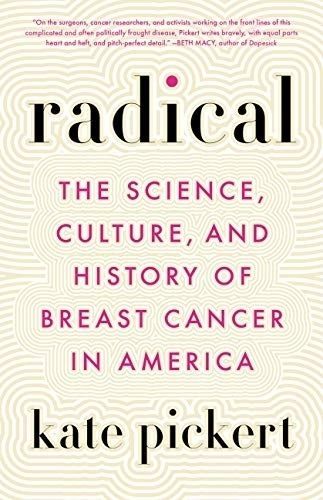
Overview
Radical: The Science, Culture and History of Breast Cancer in America is an intellectual look at breast cancer, full of fascinating details about the disease. Author Kate Pickert is a breast cancer survivor and journalism professor at Loyola Marymount University with a background in health journalism. The book covers a wide scope of topics with chapters on screening guidelines, mammography benefits and drawbacks, diagnosis, controversy around the culture of pink, side-effects of treatment, pharmaceutical development, mastectomy and reconstruction, and metastatic disease.
Throughout, Pickert integrates thoughtful accounts of her own experience with diagnosis, treatment, and recovery to personalize her journalistic approach. She was diagnosed with an aggressive form of breast cancer in 2014 at the age of 35. She considers herself lucky because of her excellent prognosis, the timing of the diagnosis after an effective drug had been discovered, living in Los Angeles with world-class physicians on her medical team, avoiding many well-known side effects of treatment, and being able to work through treatment. Still, many readers will find her reflections relatable.
“For more than a month, I had been mired in the vicious limbo familiar to most newly diagnosed cancer patients. I was crippled with anxiety about the malignant tumors growing inside me and filled with dread over the assault on my body that would soon begin. It’s a strange thing to wait for something terrible to happen when the mechanics of it are entirely unfamiliar.” (3)
She also interviewed scientists, nonprofit CEOs, and breast cancer survivors to provide first-hand accounts of scientific, cultural, and personal perspectives. If you’ve ever wondered about the thinking of the biggest names in breast cancer about their areas of specialization, Radical gives some answers. The insights she gains from key researchers are particularly illuminating, from UCSF’s Laura Esserman on changes in screening to Sloan Kettering’s Larry Norton on different chemotherapy approaches to UCLA’s Dennis Slamon on HER2 drug development.
“Slamon told me that breast cancer’s complexity and variations mean that, as maddening as it is, incrementalism is the only rational approach. Defeating breast cancer requires attacking it from different angles simultaneously with different tools and techniques, each of which must be invented and refined individually…Slamon said he knows that critics of the process mean well. ‘They are frustrated with the fact that they put this much money in and there’s only a couple of things they could point to that have really changed therapy in breast cancer,’ he said. ‘But the flip side of the coin is those things have been big things.’" (201)
The historical details Pickert includes are also impactful, especially her inclusion of accounts of breast cancer surgery before there was anesthesia and the evolution of surgical techniques and recommendations from hyper aggressive to more moderate today. She seamlessly goes between past and present with the contrasts adding context to the state of breast cancer today and leading to her hopeful conclusion.
“Progress in the fight against breast cancer in America has been, by any measure, remarkable. The patients who have demanded better treatment, the doctors developing new drugs, and public and private investments in the case have made this so. I am optimistic that this progress will continue.” (280)
Critique
While Radical is a comprehensive look at breast cancer in many ways, it has some significant oversights. More attention to inequities in breast cancer would have strengthened the book. Pickert only mentions in passing the disparities Black women face, including the increased likelihood of death from the disease, and does not address why apart from saying that there is lack of access to high quality treatments. (Learn more about breast cancer in Black women.) When discussing recruitment for clinical trials, she does not mention racial and ethnic disparities that lead to much lower rates of participation by women of color or the systemic roots of this fact. (Learn more about Black women and Latinxs in clinical trials ) She also only briefly mentions the struggles that women living in rural locations face in trying to get treatment. (Learn more about breast cancer in rural communities.) The book gives a much clearer picture of privileged experiences of breast cancer.
Another weakness is that Pickert minimizes the relevance of breast cancer risk reduction techniques that can make a difference, like eating healthy, exercising, and avoiding alcohol. While we cannot prevent breast cancer in any given person, research has shown that there are things that we can do to make it less likely that we will get breast cancer or have it recur. (Check out our 13 Ways to Reduce Your Risk of Breast Cancer campaign and Survivorship Factsheets.)
Recommendation
Radical is an in-depth look at many facets of breast cancer that are little known by the public. Pickert has done an excellent job ferreting out a wide range of historical details and contemporary truths about breast cancer. Her incorporation of her own story and interviews make the book an engaging read. If you’re a fan of audiobooks, you’ll enjoy that she is the reader, which gives additional texture to her account.

